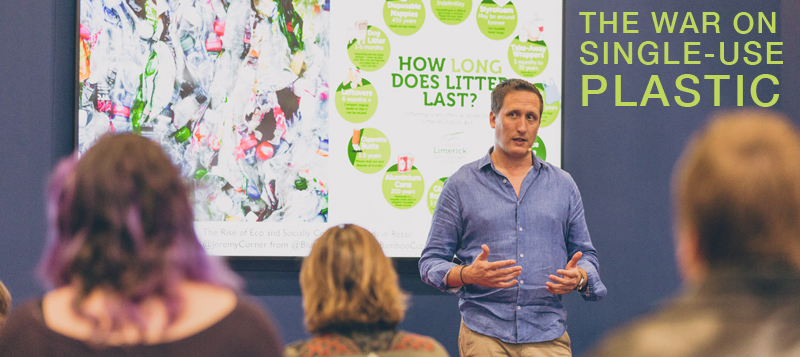
Dubbed “The Blue Planet Effect” shocking images of vast swathes of rubbish in our oceans in David Attenborough’s documentary aired on the BBC appear to have galvanised millions of viewers to take action in the war on single-use plastic.
The Queen has announced a ban on single use plastics on the Royal Estate, both the BBC and Sky have pledged to eliminate them by 2020 and communities up and down the UK are planning to go plastic free.
I spoke about this trend to retailers at Autumn Fair. The environment and socially conscious living are at the forefront of the minds of the biggest wave of consumers to walk the planet: Millennials.
Millennials
With £4.4 trillion in earnings, millennials have more spending power than any previous generation. When it comes to traditional media like TV, radio or newspapers consumption is down by half, with most choosing to learn about the world via their mobile devices.
They research products carefully and spend more freely when they choose to do so. They value authenticity in brands and retailers and will shun those they find disingenuous. They are obsessed with health, wellness and travel. Most importantly they have a passion for the environment.
Part of the reason Blue Planet has resonated so deeply is how shareable clips of it have been online. Waking us all up to the effect our mindless waste is having on our world. Particularly plastic and why it is so problematic.
Plastic Population
Plastic bottles can take 450 years to break down, plastic bags are even worse. Packaging and cups made from styrofoam may be around forever (Americans currently use 25 billion of them a year). Single use coffee cups made from paper have plastic linings and 2.5 billion of them go into landfill each year in the UK (100 billion globally). There’s half a trillion single use plastic bottles produced in the world annually. We send 6 billion of them per annum to UK landfill sites.
Plastic is everywhere 72% of European tap water is contaminated by microplastics. It’s pretty much impossible not to find them in the food we prepare in our homes and in the fish and meat we buy at the supermarket. Even the clothes we wear affect our environment. A typical polyester fleece, for example, sheds 250,000 micro plastics in it’s lifetime. Much of which is washed out to sea. So much so that there is now more plastic in the ocean than fish.
Plastic Problems
Plastic are polymers derived from hydrocarbons which are mostly derived from oil. Oil is effectively made from the hundred million year old corpses of living things that came before us. Microplastics attract organic pollutants and then contaminate our food chain causing both animals and humans a host of health problems.
BPA and Estrogenic chemicals in plastics have been linked to health issues like heart disease, hormone imbalance, increased caner risks, infertility, ADHD and even genital deformaties.
What can we do?
It’s not just Millennials that were affected by the images from Blue Planet, most of us want to do our bit too. There are four simple steps that we can all take to reduce the plastic we use in our lives.
- Refuse
You can refuse unnecessary plastic packaging.The biggest one in our daily lives is food packaging. Plastic food packaging increased by 25% between 2004-14 using 800,000 tonnes pa only a third of which is recycled. Feedback to your supermarket that you don’t want it and choose fruit and veg that isn’t wrapped in plastic.
Share excessive packaging photos on social media to get companies to take action and make change. If you are company that people are doing this to then engage with them and take action. Talk through what is needed and how you can change.
Some independent shops are now refusing to stock plastic bags. Even changing a single word at checkout can help customers to change. A retailer told me recently that they stopped saying “do you want a plastic bag” and asked instead “do you need a plastic bag.” The result was a huge drop off in single use plastic bags taken by customers.
If you can’t eliminate plastic in your life then the next step is to reduce it.
- Reduce
Laminate or cello glaze is not recyclable so try to reduce your use of them. The biggest source of this in most of our lives are Tetra Pak cartons which are laminated in polyethylene and contain a layer of aluminium which makes them difficult and costly to recycle. Most councils don’t take them at the moment. You can reduce your consumption of liquids using Tetra Paks or find alternative sources.
Glass milk bottles are on the rise again because of this trend. Similarly, SodaStream is seeing an uplift in sales as people reduce buying carbonated water in plastic bottles and make their own at home.
The card industry is making real progress on reducing plastic packaging with trials in supermarkets selling ‘naked cards.’ Asda is removing cello wrapping from the vast majority of its cards and will save over 50 million cello bags annually equivalent to 100 tonnes of plastic. Unless the card requires a bag to protect delicate handcrafted elements it makes sense to reduce the reliance on cellos or shift to greener alternatives.
- Reuse
It helps to reuse materials repeatedly, rather than discard them after a single use like we do so often after one use. That’s why it’s nice to enjoy your birthday cards or Christmas cards up around the house and even hold on to ones that have special meaning for you.
It’s the reusability that has a significant impact on single use items we get through everyday like plastic bottles, coffee cups and plastic shopping bags. Actively reusing reusable water bottles, reusable coffee cups and reusable shopping bags are small changes in habits that have a big effect when we all get involved and do our bit. There are fantastic commercial opportunities for retailers stocking these reusable products at the moment.
You can also get involved at work by reusing items whenever possible. For example, we reuse pallets and cardboard boxes when shipping from Blue Eyed Sun. This little shifts all help to reduce waste. Share this with your customers and shout about it on social media.
- Recycle
When it’s not recycled the plastic we use is either going into landfill and breaking down over hundreds of years or gets into the environment and winds up in the sea. It is estimated that we are effectively dumping a lorry load of plastic into the ocean every single minute.
We need to recycle all of our plastic both at home and in the office. Councils don’t currently recycle polypropylene film so compostable bags could be a better solution, especially if we can get all councils to make industrial composting more accessible for consumers. Greeting cards themselves are an easy material to recycle as the majority are made from paper which is recyclable.
Make sure you use your recycling bins at home and at work and encourage others to do so. If you are passionate about the environment recycling is a really important way to improve things. Small changes have a huge effect over time.
What to do Next?
Build environmental awareness and sustainability into your business. Take action, join the conversation and get involved. There are beach clean ups across the country you can join. Take little steps towards improving every month.
One way to do this right now is to book your place at the GCA AGM on 17th October at Knebworth House. Sue Morrish from Glebe Cottage (aka the Eco-friendly Card Co) and Ceri Stirland from UKG will be discussing the card industry’s environmental issues and options open to publishers and retailers. You’ll have a chance to get involved and learn what’s best for your business as well as benefitting from all the other talks and seminars on the day. I look forward to seeing you there.
Global waste produced whilst you read this blog post:
3,350 plastic straws, 19 million plastic bags, 10 million plastic bottles, 41 tonnes of nappies, 10 lorry loads of plastic dumped in the sea - all of which take hundreds of years to break down.
Read more about Business and the Environment
Find out more about our Bamboo Products
How to change your habits for good
Click on the image below to see the slides from my talk at Autumn Fair:













